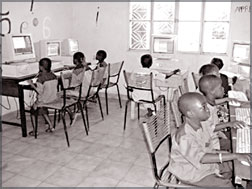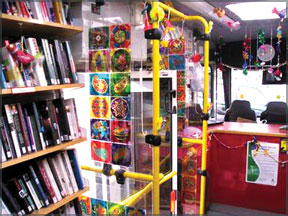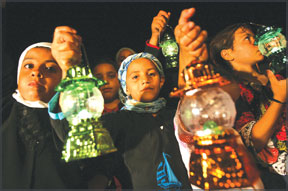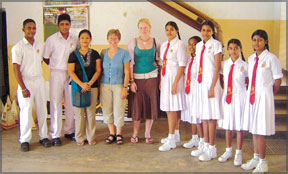
Network to connect schools
You may know about SchoolNet, the new online educational system,
which is a joint initiative of the Education Ministry and Sri Lanka
Telecom (SLT). This system is being introduced with the objectives of
improving efficiency and increasing academic achievement within public
schools across the country.
|

A school network in another country |
SchoolNet, which is part of the Ministry's Secondary Education
Modernisation Project, will revolutionise the way school administrators
operate, the way teachers teach, the way parents are involved and the
way children learn.
It will allow teachers and students from schools around the island
including rural schools to access reference material, tutorials, emails
and other educational programmes over the Internet. For the first time,
teachers will also be able to access lesson plans on their computers.
The SLT system will connect all schools in the island as one network,
and offer products such as voice, video, broadband Internet, network
services and hosting services. The first phase of the project will see
1,100 schools being connected to the network, with 5000 schools to be
connected by 2010.
The Network Operations Centre for the project will be located at the
University of Moratuwa. The servers for web applications, databases,
intranet and security will be installed at the NOC and will be
maintained by a dedicated staff. The latest ICT technologies have been
selected for the SchoolNet operations, foreseeing future requirements in
the education sector.
Met. observation complexes for Polonnaruwa, Moneragala
About two weeks ago, we had a tsunami scare. Many countries in the
Indian Ocean including Sri Lanka were in a state of uncertainty...'will
we, won't we (have another tsunami)?'
The country was better prepared this time though, especially with the
information about the earthquake and the possible tsunami spreading very
fast. Now we are more alert, and equipped with better and quicker
disaster warning systems. It's important that we are better prepared to
face not just tsunamis, but all other natural disasters.
It's with this idea that Cabinet approval was recently granted to a
memorandum on the construction of Meteorological Observation Complexes
at Polonnaruwa and Moneragala, which currently lack such facilities.
Both areas are agriculturally important districts, which are however
hampered by frequent droughts. Therefore, it has been felt that
meteorological centres are long overdue needs in the two districts.
Armed with the most current information, it's presumed that the
Meteorology Department can issue weather forecasts and warnings to
people in these areas so that they are better prepared to meet drought
and other disaster situations.
Mobile libraries for tsunami affected areas
Many libraries belonging to schools and local government bodies were
damaged and destroyed by the tsunami of December 2004. This single
disaster was responsible for wiping out entire collections of valuable
library material from many parts of the island.
|

A mobile library |
The Nena Sakmana programme was launched by the Asian Foundation in
collaboration with the American International Group recently as a means
of offsetting this loss to some extent.
The programme provides mobile libraries to the local government
bodies affected by the tsunami. The first of the vehicles to be used for
libraries were handed over to the Thirukkovil, Hikkaduwa and Hambantota
Pradeshiya Sabhas recently.
These mobile libraries are valued at over eight million rupees and
are equipped with multimedia projectors and laptop computers. They will
be regularly monitored by the National Library Services Board and the
Colombo Public Library.
The project has been launched with the objective of improving the
reading habit and IT literacy among students in the area.
Fasting season for Muslims
|

Palestinians celebrating the fasting season. Pic: AFP |
Ramazan, the holy month of fasting for Muslims, started on September
12. This is the most important month in the Islamic calendar and
commences with the sighting of the new moon, even if it is reported by
only one person. The period of fasting will end with the Ramazan
festival which falls close to October 13.
Ramazan comes yearly to remind Muslims of the declaration and
establishment of human rights in the Quran, which started to be revealed
in such a month, more than 14 centuries ago. During the month, Muslims
offer prayers, read and listen to the Quran daily, and observe strict
self-discipline through fasting. They give to the poor and have more
contact with other Muslims.
Fasting has always been an important part of religious life,
discipline and experience in almost every faith.
State Children's Art Festival
The State Children Art Festival - 2007, organised by the Department
of Cultural Affairs and the Arts and Sculpture Panel of the Arts Council
of Sri Lanka, will be held at 10.00am tomorrow at the National Art
Gallery, Colombo.
It will be ceremonially opened by Cultural Affairs Minister Mahinda
Yapa Abeywardane. Over 38,000 paintings done by children from all parts
of the island were received by the organisers.
During the first round, 150 artworks were selected from each district
and after a workshop conducted for their contributors, the best 230
paintings were selected to be presented with awards.
The awards ceremony will also be held tomorrow, at 10.30am, at the
John de Silva Memorial Theatre, Colombo. The award-winning paintings
will be displayed at an exhibition to be held from 9.00am to 6.00pm from
October 1 to 3 at the National Art Gallery.
British volunteer teachers for local school
Sue Gregory and Sinead Watt of Project Abroad, England have been
appointed as volunteer teachers to Tissa Madya Maha Vidyalaya, Kalutara
for this year.
|

The volunteer teachers with some of the students |
The British organisation has been providing volunteer English
teachers to this school from 2003 with the objective of improving the
English knowledge of these students.
The programme has been ably supported by Project Abroad's Sri Lankan
Director, Shyamali Wijesinghe, Project Co-ordination Officer, G.G.
Perera, Ligaya Kaluarachchi and British Co-ordinator, Catherine Stidston.
The project was initiated under the advice of Tissa Vidyalaya
Principal, Wilfred Weerasinghe and Deputy Chairman of the Past Pupils
Association, Janaka Mendis. |
